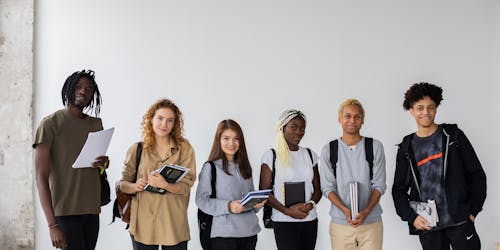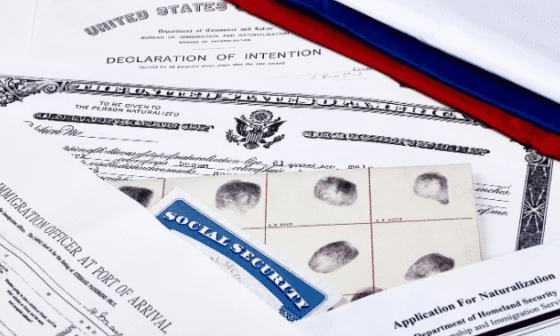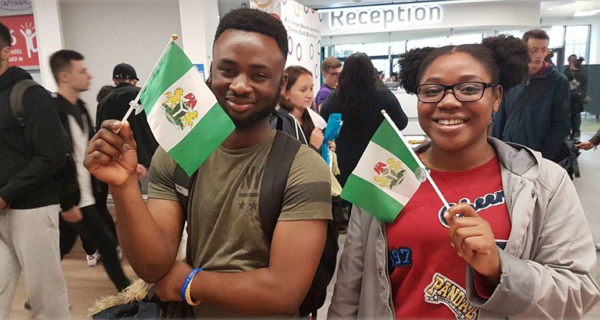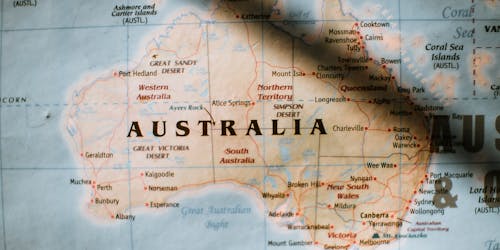Are you a Nigerian trying to migrate to the US using a student visa? You want to try the F1 student visa, but you are not sure if you qualify. Maybe you are not sure if this is the right type of student visa for you. This article is written for the purpose of directing Nigerians who want to migrate to the US using the F-1 visa. In this article, I will give you a detailed guideline on what an F-1 student visa is, eligibility criteria, the application process, how to maintain your F-1 visa after you have been approved, reasons why your visa can be denied, and more.
What is an F1 Student visa?
F-1 visa is a type of visa that allows a student to temporarily live in the United States for a definite period of time while studying at a school, college, seminary or conservatory. It is given to international students who want to attend educational institutions in the United States. It covers levels from elementary school to university and graduate school, including other degrees. F1 students must maintain the minimum course load for full-time student status.
They can remain in the US for up to 60 days beyond the length of time it takes to complete their academic program unless they have applied and been approved to stay and work for a period of time under the OPT program. F-1 students are expected to complete their studies by the expiration date on their I-20 form (certificate of eligibility for nonimmigrant student status), which is provided by the US college or university that the student has been accepted to and will attend.
Key Points
- The F-1 visa allows international students to temporarily reside in the U.S. to study at accredited institutions. Students can stay in the U.S. for up to 60 days after completing their program, unless they apply for OPT.
- To qualify, students must be admitted to a SEVP-approved institution and enrolled full-time. Applicants must demonstrate strong ties to their home country and provide proof of financial capability.
- Proficiency in English, typically proven through tests like TOEFL or IELTS, is required. Necessary documents include a valid passport, photographs, Form DS-160, proof of paid fees, and Form I-20. The application process involves SEVIS registration, paying the I-901 fee, and scheduling an embassy interview.
Is the F-1 Student Visa Right for Me?
The chance to study in the United States is the culmination of years of hard work and dedication for many students. Unless the student is already a U.S. citizen or green card holder, all prospective students will have to apply for a student visa to study in the United States. The F-1 student visa, due to the broad course and areas to study in the US, has a broad application process, but the rules are very clear. The first is that I have to come to the United States with the intention to temporarily study, and this is not an immigrant visa.
Another one is that you must be studying at an academic institution, not training at a vocational school, as this requires an M1 visa. The Department of Homeland Security must approve your academic institution through the Student Exchange and Visitor program, meaning it needs to be accredited to be able to accept foreign students on an F-1 student visa.
Since this is a non-immigrant visa, you will be able to work, but there will be restrictions on where you can work and the type of work. Finally, although your spouse and children can come with you, they will not be able to. Your children can enrol in school, but they have to be on an F-2 visa tied to your visa status.
Do I Qualify to Apply for an F-1 Student Visa?
To qualify to even apply for an F-1 student visa, you must meet some specific conditions. The eligibility for F-1 includes:
#1. Get Admitted to SEVP-Accepted Institutions
The student exchange vision program has a list of schools and academic institutions that meet the conditions and accept international students. Before you apply to your preferred schools or universities, it is recommended that you first check the SEVP to see if the institution is listed there. If the institution is on the list, you can proceed to send them any required documents for admission. But if they are absent, you should not apply because you will not get the student visa even if you are accepted into the school.
#2. You Must Be Enrolled as a Full-Time Student at the Institution
Before you qualify to be a full-time student, it’s essential to ensure you are enrolled as a full-time student at any institution, this will help your chances of getting the visa.
#3. Have Strong Ties to Your Home Country
You must provide documents proving you have strong ties to your home country and you also intend to go home after your educational program ends. It will be more difficult to get an F1 visa.
Advertisements
#4. Proof Financial Proficiency
You should prove you have sufficient funds in your bank accounts to cover the expenses of studying and living in the United States. This, in any case, doesn’t mean F1 student visa applicants are not eligible for scholarships. In fact, you are encouraged to apply for scholarship funds and organisations to lower your financial burden.
#5. Be Proficient in English
You have to prove that you can speak and understand English at levels that enable you to enrol in an academic program. Students can prove their language proficiency by taking a standardised English proficiency test such as the TOEFL or the IELTS.
What Are the Documents Required for a F1 Student Visa?
The documents required by the United States from the applicant applying for an F1 student visa include:
- Your valid passport
- Two photographs meeting the US visa photo requirements
- Form DS-160 for non-immigrant visa applications
- Proof of paid F1 visa fees
- Form I-20. This is where you have the financial proficiency to fund your studies and live in the United States. Documents to be provided under this include:
- Bank Statements for the last three years
- Tax records for the last three years
- Pay stubs of previous employment
- If you have received a scholarship, you will also need to prove it
- It is not mandatory but paying a full semester or a year’s worth of tuition is a good idea
- If you are funding your US education through a loan, you must show proof of the approved loan
- If you are supported or sponsored by someone else in the US, you will need to submit form I-134, affidavit of support, and bank statements for the last three years of the person
- Documents that prove your previous education and current qualifications
- Original transcripts
- Standardised test score
- Previous degree diploma
- Acceptance letter from the educational institute which accepted you
- Proof of purchased health insurance for international students
What Are the Processes Involved in the F-1 Visa?
For you to get to this stage, it means an SEVP-approved school has accepted your application. So congratulations!! I’m super proud of you. Now, lets get to the next step.
After your SEVP-approved school accepts your enrollment, you will be added to the student and exchange visitor information system (SEVIS). SEVP uses SEVIS to monitor as well as track schools, exchange visitor programs, and F, M, and J nonimmigrants while they visit the United States and participate in the U.S. education system.
Once you have registered with SEVIS, you will be required to pay the I-901 fee. This fee is currently 511,000 naira ($350) and funds the SEVP program. Your SEVP-approved school will then give you a Form I-20, which is credibly important to you as it confirms your acceptance at the school and also stands as your eligible F-1 visa. You will be able to apply to a US embassy or consulate for your F-1 visa once you have received your Form I-20. This step varies depending on the US embassies or consulates; ensure you check their websites for further information.
Advertisements
But generally, you must complete Form DS-260 for immigrant visas. This form is well-detailed and can take some time to fill out, so make sure you set aside plenty of time to complete it. After completing the form DS-260, the next thing is to schedule an interview at the US embassy or consulate, unless you are under the age of 13 or over 80 years old. The US embassy or consulate for the interview should be the one located in the country where you live. You can schedule your interview at the US embassy or consulate located in another country, but keep in mind that it may be difficult to qualify for a visa outside the country where you live.
Before your interview, you will be required to pay a 270,100 naira ($185) application fee and, based on your nationality, an insurance fee as well. The visa insurance fee is only due after your interview if your visa is approved. The next step will be an interview at the US embassy or consulate.
Visa wait times can vary depending on the time of year and location. You can use the appointment wait time tool to see how long you will have to wait for an appointment at a specific US embassy or consulate.
It is important to note at this stage that F-1 visas for new students can only be issued up to 365 days in advance of the start date for a course of study. It was usually 120 days until February 2023, when the Department of State extended the period.
What Is the Validity of the F-1 Student Visa?
When your visa is approved, it might be for the full time that you will be in school in the US or less. If your study program takes 2 years to graduate, it is mostly like the embassy will give you a visa that is valid for 1 year, then you will have to renew it later.
The validity of your F1 student visa is as stated on your Form I-20 and Form I-94, which will be given to you when you enter the United States. There is a possibility of waiving the interview questions during renewal for the reason that you have done it before and your intention is to continue your education for the remaining three years to get your degree.
If your visa is approved, you are allowed to depart for the US 30 days before your program commences. You cannot enter the US earlier than that.
What Is the Processing Time for F-1 Student Visa?
You will get a response immediately after the interview, in most cases. At the end of the interview process, the interviewer might congratulate you for getting a visa or provide you with a document letting you know the reason for you Denial because the visa process usually happens before your interview. The interview happens to be the last step for the US Embassy to assess whether they should approve your visa.
But in some cases, the processing and approval can take several days, so you should be patient if that’s the case for you.
What Do You Need to Know About F-1 Student Visa Interview Questions?
Whether or not you are qualified for the F1 student visa, an interview will be required. You should arrive at the interview with all of the required documents and receipts. You should also prepare ahead of time to answer personal questions about your decision to study in the US. There are a number of F-1 student visa interview questions, and they include:
- Why did you choose to study in the US instead of joining the workforce in your home country?
- How are you funding the entire duration of your education, including tuition, room, transportation, and board?
- After you graduate, do you plan to return home or do you plan to stay here?
- Why did you choose this school, and why is it the best school for you?
- What are your scores (GRE, SAT, TOEFL, IELTS, GMAT), your GPA, and your overall performance as a student in the past?
During the student visa interview, the officer might ask these questions in different ways, but they are all asked for the same purpose, which is to make sure you qualify for the F1 visa. If you answer the question in a satisfactory manner, the consular officer can approve your application. It is important to answer all questions truthfully and sincerely.
The consular officer will also take your fingerprints during the interview, although it varies based on location. After the visa interview, the consular officer may determine that your application requires further administrative processing. The officer will let you know if that’s your case.
For the F-1 student visa interview, you will be required to bring the following documents:
- The form DS-260 confirmation page.
- Application fee payment receipt
- A photo that confirms the US State 9f Department requirements
- Form I-20 that was issued to you by your academic institution
- An unexpired passport Valid for six months beyond the intended date of entry into the United States. Each individual who needs a visa must submit a separate application, including any family members listed in their passport.
You should also be ready to bring evidence of:
- Transcripts, diplomas, degrees, or certificates from school you attended.
- Standardised test scores required by your US school
- Proof of ties to your home country as well as proof of funds
Why Your F1 Visa Can Be Denied
If your visa is denied, it is most likely based on US immigration law. If you are denied, the reason and section of law you are denied under will be given to you in your paperwork. Some applications are denied, probably because the applicant failed to provide the necessary information or supporting documentation as required. You can sometimes be found ineligible for other reasons.
Of course, if you do not meet the F1 visa qualifications as stated above, you can expect to be found ineligible. For example, if you do not sufficiently demonstrate that your strong ties to your home country will influence you to return home after your stay in the US, you will be denied under INA Section 214(b) visa qualifications and immigrant intent.
Other common reasons for Denial include fraud, misinterpretation, unlawful presence in the United States, and health-related grounds.
How Do You Maintain the F-1 Student Visa Status After You Arrive?
After your F-1 student visa has been approved, you are permitted to enter the United States as an international student. However, you must be aware of your obligations as an F-1 visa holder. If you do not maintain your status, you will not be allowed to rent in the US if you leave, and you will not be eligible for practical training (OPT or CPT) or on-campus employment.
Here are some tips to help you maintain your F-1 student visa in the US:
#1. Upon Arrival
Make sure you only arrive at the US no more than 30 days prior to the first day of classes. Check-in with your international advisor as soon as possible before your program begins.
#2. During Your Program
You must remain enrolled full-time. Always go to class and maintain passing grades. If you are having difficulty in your classes, notify your international advisor. If you are unable to complete your program by the date listed on your Form I-20, your international advisor can help you request your program extension.
The validity of your passport in the future should be at least 6 months. Your country’s consulate or embassy can help you expand your passport if needed. Carry a copy of your passport along with your Form I-94 card for identification purposes.
#3. Working
One of the downsides of an F-1 student visa is that students under this visa are not allowed to work off-campus. However, you may have some on-campus work or curricular practical training options if you qualify. Check with your international advisor to see if it is possible for you. If you choose to work without proper authorization, your visa might be revoked, and you might be deported back to Nigeria.
#4. Upon Program Completion
You have 60 days upon program completion to leave the United States under the F-1 visa. To remain in the US, you will need to re-enrol in the higher program, transfer to another school to receive a new I-20 form or apply to change your visa status. Your international advisor can give you more information regarding this option.
What Is the Difference Between Study Visa and Student Visa?
A study permit is typically obtained before entering the country, and it may need to be renewed periodically to continue studying. The student visa is often linked to the educational institute and has a specific duration aligned with the length of the study program.
What Does a Student Visa Give You?
However, there are limits to how much you can work and where a student visa can offer the benefit of helping to cover some of your expenses while you study. Depending on your university, you may also be able to get a campus job or an internship, both of which can further offset your cost of living.
Which Is Better, a Canadian Work Visa or a Study Permit?
The significance of a study permit is its potential as a pathway to permanent residency in Canada. Unlinking many work permit options tied to LMIA, which often does not lead to permanent residency, a study permit offers a more direct path for future immigration.
Conclusion
In conclusion, if you are applying for the F-1 student visa but you have dependents, such as a spouse or unmarried children under the age of 21, they are allowed to join you, but they will have to apply for the F2 visa. Ensure that you meet all the eligibility requirements before applying for the visa to avoid wasting your time and resources, because failure to meet the requirements will surely result in visa denial. Ensure to follow the rules attached to the F-1 visa when you arrive in the United States to prevent the embassy from revoking your visa.
Related Articles
- Japa Plans? Here’s How to Get a Work Visa Without Stress 2024
- France Visa Application: Avoid These Critical Mistakes or Risk Denial
- The Ultimate Schengen Visa Application Checklist: Steps Most People Miss
- Top Fully Funded International Scholarships for Nigerian Students In 2024-2025
References
Advertisements






